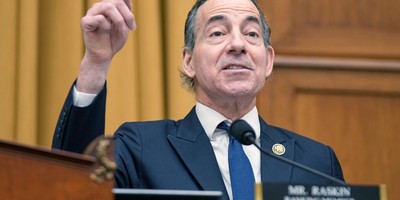One evening during the height of the controversy over the commission, I turned on the network news to hear my name being vilified by none other than Hooks. He was in full throat, railing against the new direction at the commission, and me in particular. I still hadn't met him face to face, but that was to come later, at the 1984 Republican National Convention in Dallas. I was seated up in the balcony, when Hooks walked in and sat down. I chided him about some of the things he'd said about me, and told him I had been an NAACP member and marched in civil rights demonstrations in the 1960s. At which point, he said, "Get out your checkbook. You're about to become a lifetime member of the NAACP. We welcome you back into the fold." And there on the spot, he insisted I write a check putting me back "in good standing" with the NAACP. I was dumbstruck -- but he wasn't a man you could easily refuse.

Years later, Hooks and I went on a tour of schools around the country debating affirmative action. He walked with a cane and his wife, Patricia, was often with him to help him get around. But whatever pain and infirmities he suffered, he still managed to debate forcefully. But I often felt, as I looked out over the crowd of young men and women, that the world of widespread racism and discrimination Ben Hooks described was unfamiliar to his audience and a relic of the past. He seemed locked in a world of Jim Crow that simply didn't exist any longer. He made the old arguments for affirmative action -- that it was necessary to make up for the effects of past discrimination -- as if little had changed in the years after Selma and Birmingham.
Recommended
But the kids he was trying to reach had never faced such discrimination. They were often the children -- in some cases, grandchildren -- of college graduates who had benefited from affirmative action programs, and their arguments in favor of the programs that granted them preferential treatment were all about promoting "diversity."
The irony couldn't have been greater at one of our last joint appearances. We were at a New England prep school debating affirmative action before an audience of high school students, which included a number of young blacks who, in Hooks' youth, could not have imagined attending such an institution. We'd gone through our prepared remarks and some back and forth with questions from the audience when Hooks decided he wanted to end the program on a high note. He stood up from the table and pulled me up with him, locking arms.
"We shall overcome, someday," he sang, in a deep, rich baritone, swaying in time with the song. And, of course, I joined in, as did the faculty on stage and the kids in the audience. But the fact we were there and that the audience included young, privileged children of all races whose futures couldn't have been brighter sang louder than our voices that we had overcome, not someday, but now.
Benjamin Hooks lived to see the promise of the movement he helped lead, even if he wouldn't have admitted it.

























Join the conversation as a VIP Member